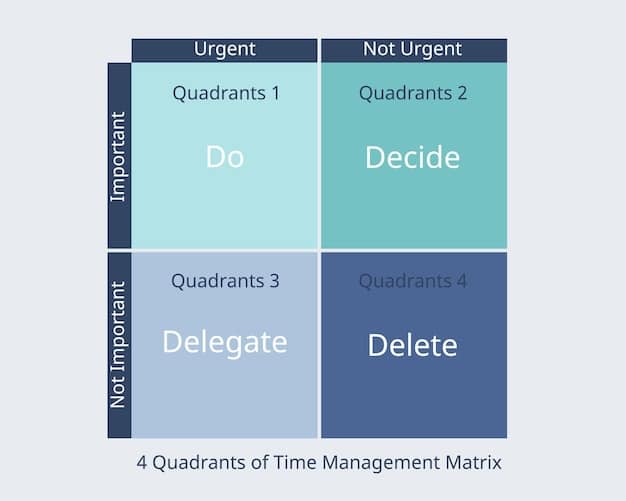Mastering Time Management: A Student’s Guide to Success

Mastering time management is crucial for students balancing academics, work, and social life, requiring effective strategies like prioritization, scheduling, and minimizing distractions to achieve academic success and overall well-being.
Juggling academics, work, and social life can be overwhelming for students. Effective mastering time management is the key to staying on top of your commitments, reducing stress, and achieving a fulfilling student life.
Understanding the Importance of Time Management for Students
Time management isn’t just about fitting more into your day; it’s about making the most of the time you have. For students, this means balancing academic responsibilities, part-time jobs, social activities, and personal well-being. Understanding why time management is important can provide the motivation needed to develop effective strategies.
Reduced Stress and Improved Mental Health
Poor time management often leads to increased stress and anxiety. When tasks pile up and deadlines loom, it’s easy to feel overwhelmed. By effectively managing your time, you can reduce these feelings and improve your overall mental health.
Enhanced Academic Performance
Effective time management directly contributes to better academic performance. By planning study sessions, allocating time for assignments, and reviewing materials regularly, you can improve your understanding and retention of information.
- Prioritize tasks based on urgency and importance.
- Break down large assignments into smaller, manageable tasks.
- Allocate specific time slots for studying each subject.
- Review materials regularly to reinforce learning.
Ultimately, recognizing the impact of structured time on your well-being and academic success is the first step toward adopting better habits. Once you see the benefits, you’ll be more motivated to maintain these strategies.
Setting Realistic Goals and Priorities
Before diving into specific time management techniques, it’s essential to set realistic goals and prioritize tasks. This involves identifying your objectives, understanding your limitations, and focusing on what truly matters.
Defining Your Academic and Personal Goals
Start by defining your academic and personal goals. What do you want to achieve this semester? What skills do you want to develop? What personal milestones do you want to reach? Writing down these goals can help you stay focused and motivated.
Prioritizing Tasks Using the Eisenhower Matrix
The Eisenhower Matrix, also known as the Urgent-Important Matrix, is a powerful tool for prioritizing tasks. It involves categorizing tasks into four quadrants: Urgent and Important, Important but Not Urgent, Urgent but Not Important, and Neither Urgent nor Important.

By understanding where each task falls, you can make informed decisions about what to tackle first, what to schedule for later, what to delegate, and what to eliminate altogether.
- Urgent and Important: Tasks that require immediate attention, such as studying for an upcoming exam or completing a critical assignment.
- Important but Not Urgent: Tasks that contribute to long-term goals, such as planning a research project or attending a career development workshop.
- Urgent but Not Important: Tasks that demand immediate attention but don’t contribute significantly to your goals, such as responding to non-critical emails or attending unnecessary meetings.
- Neither Urgent nor Important: Tasks that are time-wasters and should be eliminated, such as excessive social media browsing or unproductive activities.
Learning to differentiate between urgency and importance allows for a clearer focus on objectives and a greater sense of control over your time.
Creating an Effective Schedule
An effective schedule is the foundation of good time management. It provides a visual representation of your commitments and helps you allocate time for different activities. There are different ways to approach scheduling, so finding the method that works best for you is key.
Using Digital Calendars and Planners
Digital calendars, such as Google Calendar or Outlook Calendar, offer a convenient way to schedule and track your activities. They allow you to set reminders, schedule recurring events, and share your calendar with others.
Time Blocking Techniques
Time blocking involves dividing your day into specific blocks of time and allocating each block to a particular task or activity. This technique can help you stay focused and avoid distractions.
For example, you might block off two hours in the morning for studying, one hour in the afternoon for exercise, and three hours in the evening for work. The key is to be realistic about how much time each task will take and to stick to your schedule as closely as possible.
- Schedule specific time blocks for studying, working, and social activities.
- Set reminders for important deadlines and appointments.
- Be flexible and adjust your schedule as needed.
Creating and maintaining a realistic and adaptable schedule can greatly reduce the feeling of being overwhelmed and increase productivity.
Overcoming Procrastination and Distractions
Procrastination and distractions are common enemies of effective time management. Learning to overcome these challenges is crucial for staying on track and achieving your goals. Identifying the root causes of procrastination and implementing strategies to minimize distractions are key steps.
Identifying the Root Causes of Procrastination
Procrastination often stems from fear of failure, perfectionism, or lack of motivation. Understanding the underlying reasons for your procrastination can help you develop strategies to address them. Sometimes, it’s as simple as breaking down a large task into smaller, more manageable steps.
Minimizing Distractions in Your Study Environment
Creating a distraction-free study environment is essential for staying focused. This might involve turning off notifications on your phone, finding a quiet study spot in the library, or using website blockers to avoid social media and other distracting websites.

Another strategy is to use the Pomodoro Technique, which involves working in focused bursts of 25 minutes followed by a short break. This can help you maintain concentration and avoid burnout.
- Use website blockers to limit access to distracting websites.
- Find a quiet study environment where you can focus.
- Take regular breaks to avoid burnout and maintain concentration.
Taking control of your environment and addressing the reasons behind procrastination can significantly enhance your ability to manage your time effectively.
Balancing Academics, Work, and Social Life
One of the biggest challenges for students is balancing academics, work, and social life. Finding the right balance is essential for maintaining well-being and preventing burnout. Strategies for integrating these different aspects of your life can help you achieve a more harmonious and fulfilling student experience.
Integrating Social Activities into Your Schedule
Social activities are an important part of the student experience, but they can also be a major time drain. Integrating social activities into your schedule, rather than letting them take over, can help you maintain a healthy balance. Schedule specific times for socializing with friends and attending social events.
Setting Boundaries and Saying No
It’s important to set boundaries and learn to say no to commitments that you can’t realistically manage. Overcommitting can lead to increased stress and reduced productivity. Be realistic about your capacity and prioritize your well-being.
Explain to friends and colleagues that you need to focus on certain tasks and will be unavailable during specific times. Most people will understand and respect your boundaries. Make time for relaxation and hobbies to recharge.
- Prioritize activities that bring you joy and relaxation.
- Communicate your boundaries clearly to others.
- Make time for self-care activities, such as exercise, meditation, or hobbies.
By proactively managing your engagements and prioritizing your health, you create a sustainable rhythm that prevents burnout and maximizes outcomes in all areas of life.
Tools and Resources for Effective Time Management
There are numerous tools and resources available to help students improve their time management skills. From apps and software to books and workshops, exploring these resources can provide valuable insights and support.
Utilizing Time Management Apps and Software
Many time management apps and software programs can help you track your time, set goals, and prioritize tasks. These tools often offer features such as task lists, calendars, timers, and progress tracking. Popular examples include Todoist, Trello, and Asana.
Seeking Guidance from Academic Advisors and Counselors
Academic advisors and counselors can provide personalized guidance on time management and study skills. They can help you identify your strengths and weaknesses, develop effective strategies, and connect you with additional resources.
Attend workshops or seminars on time management offered by your university or college. These sessions often provide practical tips and techniques for improving your time management skills. Explore books and articles on time management and productivity. Many well-regarded resources offer valuable insights and strategies.
- Experiment with different tools and techniques to find what works best for you.
- Seek advice from academic advisors and counselors.
- Attend workshops and seminars on time management.
By continuously seeking knowledge and support, you can greatly enhance your ability to manage not just your time, but your entire approach to achieving goals and navigating challenges.
| Key Point | Brief Description |
|---|---|
| ⏰ Goal Setting | Define clear academic and personal objectives. |
| 📅 Scheduling | Plan tasks using calendars & time blocking. |
| 🚫 Distractions | Minimize interruptions for enhanced focus. |
| ⚖️ Balance | Integrate academics, work, and social life. |
FAQ Section
▼
Time management skills enable students to balance academic, work, and social activities. It reduces stress, enhances academic performance, and promotes overall well-being by fostering better planning and prioritization.
▼
The Eisenhower Matrix categorizes tasks by urgency and importance. You focus on urgent and important tasks first, schedule important but not urgent tasks, delegate urgent but not important tasks, and eliminate those that are neither.
▼
Techniques include using digital calendars, time blocking, and setting reminders. Time blocking involves allocating specific time slots for tasks, while digital calendars and reminders help keep track of deadlines and appointments.
▼
Address the root causes by breaking tasks, minimizing distractions, and creating a distraction-free environment. The Pomodoro Technique, which involves short focused work periods followed by breaks, can also combat procrastination.
▼
Many time management apps and software programs, such as Todoist and Trello, can track time and set goals. Seeking guidance from counselors and attending workshops boost skills, connecting you with additional support.
Conclusion
In conclusion, mastering time management is an essential skill for students seeking academic success, a balanced lifestyle, and reduced stress. By setting realistic goals, prioritizing tasks, creating effective schedules, and overcoming procrastination, students can effectively manage their time and achieve their full potential.





